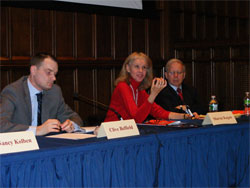The Inequities of Early Childhood Education
Speaking at a forum of The Campaign for Educational Equity at Teachers College on April 6, Kagan said that the nation’s early childhood system is vastly different than that of K-12 education in that it lacks an overarching governance structure, a guaranteed funding stream, and even requirements for professional certification for those who teach the youngest children—all of which has led to widely varying levels of quality and access.
“Ultimately, when well done, early childhood education can reduce inequities,” Kagan said. “The concern that we all have is that in the haste to get money out the door, in the haste to get programs up and running, in the haste of policymakers trying to make a mark for themselves, what is happening is not necessarily well-done programs, and so rather than alleviate inequities they perpetuate them.”
Kagan’s presentation was part of The Campaign’s ongoing series of forums on research reports prepared by scholars on issues that affect educational equity. Previous forums have dealt with American policy toward multilingual education; class size, and testing and accountability.
In discussing her paper, “American Early Childhood Education: Preventing or Perpetuating Inequity?,” Kagan was joined by discussants Clive Belfield, Associate Professor at Queens College, and Nancy Kolben, Executive Director of Child Care Inc.
Kagan is considered among the world’s leading experts in early childhood education. The author or editor of 13 books and more than 250 articles, Kagan is best known for her policymaking, serving on national boards and panels assessing early childhood education standards. She chaired the National Task Force on Early Childhood Accountability and co-authored its 2007 report, Taking Stock: Assessing and Improving Early Childhood Learning and Program Quality, which chronicled the pervasive problem of accountability in early care and education. She was also a major contributor to Tough Choices or Tough Times, a report released by the
At the TC forum, Kagan said that the inequities in early childcare education are inextricably linked to race and class. She noted that preschool participation rates vary by race and ethnicity with Hispanic children maintaining the lowest enrollment levels, primarily because they lack access to such programs. African-American children, meanwhile, experience the highest rates of expulsions from state pre-kindergarten programs. And Kagan noted that children from higher-income families are much more likely to attend preschool than those from low-income ones.
Kagan also found that geography plays a role in perpetuating inequities. She said 11 states do not have pre-kindergarten programs for four-year-olds, and in those states that do offer early childhood education, the investment varies widely from nearly $10,000 per child in
These equities are exacerbated, she said, by state policies that fail to set quality or certification standards for early childhood programs and teachers. She pointed out that 21 states do not require that a preschool teacher hold even a bachelor’s degree. Such lack of standards leads to wide variation in quality that invariably favors higher-income families, she said, who are more likely to be in programs with better trained and compensated teachers.
Kagan set out a series of policy recommendations for building an equitable, high-quality early childhood system. Given the vast differences among states, Kagan called for implementing a common set of standards for the licensing of early childhood education programs in all 50 states.
She also called for a quality rating system in which all licensed early childhood education programs and centers would be required to participate in, perhaps as a condition of their licensure. In addition, she said the country needs to implement national early-learning standards as a way to set equal expectations for children, regardless of race or class. “I think standards provide the basis for codifying what children should know and do, what teachers should know and do, and what the curriculum should be,” she said.
In addition, she said there should be an early childhood credential for lead teachers, as well as a national “salary floor” that would ensure those educators were compensated adequately in terms of pay and benefits. Kagan also highlighted the need for re-conceptualizing early childhood education as a right comparable to public education, and thus available to any family who wished to enroll their children in such programs, regardless of ability to pay.
“We are at a very propitious time for young children in this country,” Kagan said. “More money is coming into early childhood education than ever before. How we spend it and the degree to which we use wisdom is really going to determine whether we perpetuate or whether we prevent inequities.”
Published Wednesday, Apr. 8, 2009
